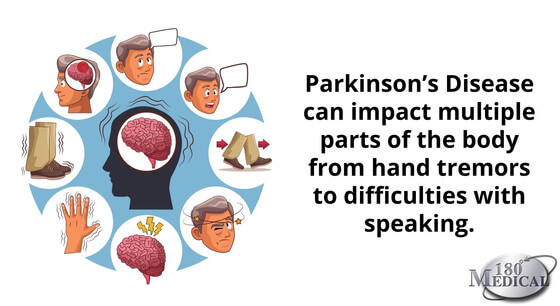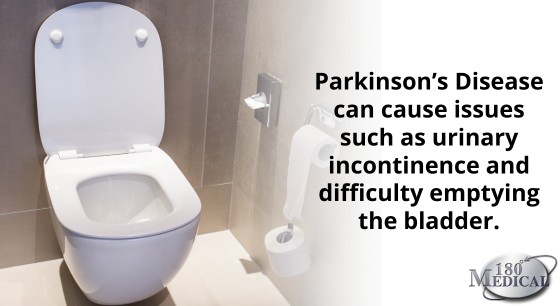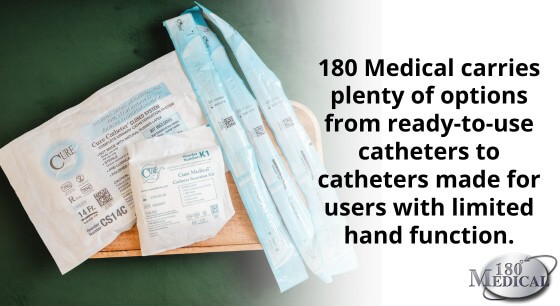
April is Parkinson’s Disease Awareness Month, a time to shine a light and raise awareness about this disease, its symptoms, and its unique challenges. There may also be a link between Parkinson’s and bladder control issues. Urinary problems such as frequent urination, incontinence, or difficulty emptying the bladder may occur. Using a catheter may be helpful in certain cases, but it may not work for everyone with this disease.
Let’s dive into learning more about Parkinson’s disease, its symptoms, and how catheters may assist when facing urinary issues.
What is Parkinson’s Disease?
Parkinson’s disease is a progressive neurological disorder that primarily affects movement but can also have non-motor symptoms.
It occurs when nerve cells in the brain that produce dopamine become impaired or die. Dopamine is a neurotransmitter that sends messages to the part of the brain that controls movement and coordination. As Parkinson’s progresses, the amount of dopamine produced in the brain decreases, leaving a person unable to control movement normally.
However, it doesn’t only impact motor function. It can affect mental health, breathing, and even digestion.

What are the Symptoms of Parkinson’s Disease?
At first, the earliest symptoms may be hard to notice right away. However, the Parkinson’s Foundation provides a list of 10 early symptoms to spot, such as a loss of smell or increasingly smaller handwriting.
Here are some of the other symptoms of Parkinson’s disease as it progresses:
- Tremors or shaking in hands and limbs
- Slowed movement
- Rigid muscles
- Impaired posture and balance
- Loss of automatic movements like smiling or swinging arms as you walk
- Speech changes like softer volume and slurring
Symptoms and their severity may vary from person to person.
How Parkinson’s Disease Affects the Bladder
Parkinson’s disease, as it progresses, may impact bladder function and urinary control. People affected by this disease may notice several different urinary problems.
- Increased urgency and frequency of urination
- Nocturia (urinating at night or during sleep)
- Urinary incontinence and bladder leakage
- Incomplete bladder emptying or difficulty emptying the bladder at all
Bladder issues due to Parkinson’s disease may occur because it can impact the nerves that control the bladder muscles. Understandably, all these issues can further impact the overall quality of life and lead to issues like depression and isolation.

What Are Some Treatment Options for Bladder Control with Parkinson’s Disease?
While there is no known cure for Parkinson’s disease, specialized doctors and healthcare providers may be able to offer several options to help control or reduce the worst symptoms of Parkinson’s disease, including issues with bladder control.
Talk to your doctor to see what is right for you. They may suggest specific medications that can help manage your symptoms, lifestyle changes such as Kegel exercises, avoiding bladder irritants, or surgery in some cases.
They may also address the need for incontinence supplies for bladder leakage and bladder control issues or intermittent catheters for emptying the bladder fully. You may need to seek treatment with a urologist to determine what may work best for your individual needs, depending on your current mobility level and hand dexterity.
Can Intermittent Catheters Help with Bladder Issues?
Catheters do help manage bladder issues for many people. It simply depends on what works best for each person and their individual condition.
For some people living with Parkinson’s disease, bladder control can be a big challenge. Intermittent catheters can sometimes help play a role in managing Parkinson’s disease-related bladder issues like incomplete bladder emptying or bladder retention (inability to release urine).
The use of urinary catheters may seem scary at first, but many thousands of people use catheters every day to empty their bladder. Often, they find it can help them maintain or improve their quality of life and independence.
It’s a more discreet solution than indwelling Foley catheters with attached urine drain bags since you insert the catheter, drain the bladder as you normally would, and then throw the intermittent catheter away after use. Plus, keeping the bladder emptied may help reduce instances of bladder leakage.

Choosing the Right Catheter for Bladder Management with Parkinson’s Disease
When it comes to choosing an intermittent catheter type for your needs, several factors come into play. In addition to your health insurance plan’s coverage for catheters and your doctor’s prescription, you’ll want to consider what feels easiest to use, comfortable, and fits your body and lifestyle.
Many people with Parkinson’s disease have limited hand function and tremors, which may impact the ability to independently self-catheterize. However, there are still options. 180 Medical carries several catheters for limited hand dexterity. Plus, a caregiver or family member can handle performing catheterization.
Of course, your prescribing healthcare provider is the best resource for determining what’s right for you. But if intermittent catheterization is the best option, 180 Medical is here to support you every step of the way.
Our trained Product Specialists are ready to help you navigate your catheter options and understand your insurance coverage. We can even send you free catheter samples to get started!
Contact us today to explore your options and experience our award-winning customer service.
Disclaimer: This article is not medical advice. Please do not use it in place of a visit, call, or consultation with a qualified healthcare provider.